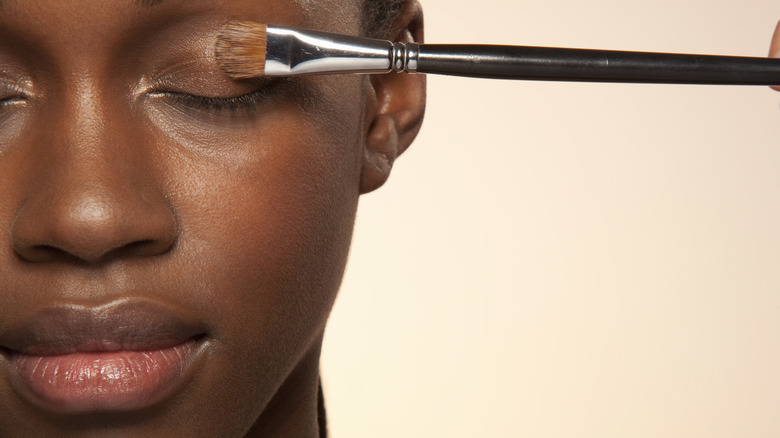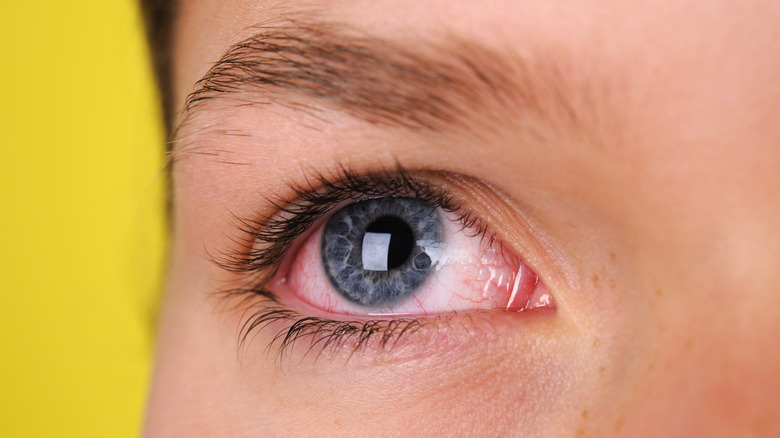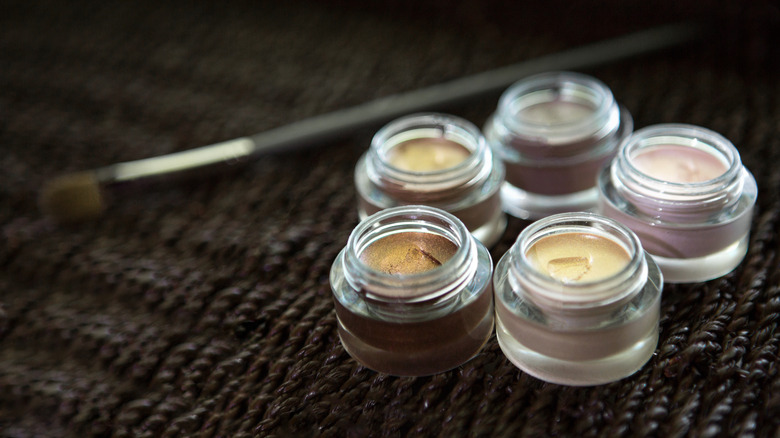Swap Powdered Eyeshadow For Cream If You Have Sensitive Eyes
Eyeshadows are a makeup favorite for obvious reasons. They draw attention to your peepers in a subtle or dramatic way depending on the shade you choose and they have an amazing way of pulling a look together.
But one of the pitfalls of wearing eyeshadow is powder fallout – that's what happens when the glittery particles of the eye makeup get in and around your eyes (and other parts of your face) as the day wears on. We've all been there, but for those with sensitive eyes, this can mean a bigger problem than getting a bit of pigment on your favorite white button-down shirt. You might experience redness, swelling, itching, tearing, and even painful sensations in and around your eyes. Before you know it, you're left wondering if you should be wearing any eyeshadow at all.
Despite what you think, there might be hope for you yet. Consider swapping the powdered stuff for cream eyeshadow. While not as commonly known as the regular kind, cream eyeshadows are also the better alternative for those with mature skin, because they don't rest on (and ultimately draw attention to) fine lines and wrinkles like powdered eye makeup does. Just to add a bit of context, here's how powdered shadows compare to the cream kind when it comes to sensitive eyes.
Powdered shadows can seriously irritate and even damage your eyes
In the case of common eye irritants for those with sensitive eyes, the culprits are usually fragrances, colorants like phenoxyethanol, preservatives like benzalkonium chloride (BAK) and formaldehyde, parabens, loose glitter, nickel, and talc. New York City-based ophthalmologist Dr. Ashley Brissette told Rose Inc, "When I examine eyes with a microscope, I can see the particles floating around on the eyes often. These particles migrate and can scratch or irritate the surface [of the eye]."
Additionally, the pigments found in powdered eyeshadow can make their way to the lining of your eye and stain the conjunctiva and subconjunctiva, which can also cause irritation in the long run.
With cream eyeshadows, you won't have to worry about glitter or potential allergens getting in your eye. The liquid-like consistency of the stuff keeps what's supposed to be on your lids firmly in place. Furthermore, creams can be applied using your fingers if you don't have a brush lying around, making them an excellent choice for when you're on the go and want a quick touch-up. Because of their texture, they are also easy to blend into the skin and you only need a small amount of the eyeshadow to get the desired effect. If you have particularly dry skin, especially around your eyelids, creams work better in that scenario, too. They go on a lot smoother and also leave a dewy finish.
Always make sure the ingredients in eyeshadow are safe for sensitive eyes
NYU Langone Health assistant professor John G. Zampella told Self, "Your eyelid skin is the thinnest skin on your body, outside of maybe your genitals." This means the skin on your lids is sensitive as it is without it being of particular concern for those with powdered eyeshadow sensitivities.
While creams are better than powders for those with sensitive eyes, this doesn't mean you should avoid reading and understanding what's on the label. The beauty industry isn't as regulated as you'd imagine and oftentimes, eye makeup products that use terms like "natural," "hypoallergenic," or "ophthalmologist-tested" aren't to be taken literally, shared ophthalmologist Dr. Rupa Wong in a YouTube video. According to Wong, the best way to tackle irritated eyes caused by eyeshadow application is to scale back on eye makeup completely and to start introducing one product at a time to see what the irritant is. She also cautioned, "You can develop an allergic reaction to a product even if you've used that product one, ten, and even a thousand times before."
Ultimately, the general rule of thumb is to treat your eyes (and eyelids) as gently and safely as you possibly can and to avoid beauty products that cause harm to your eyes. If you are swapping out powder for cream eyeshadows, try brands that are created by ophthalmologists, recommended Wong. There are plenty of them out there.


